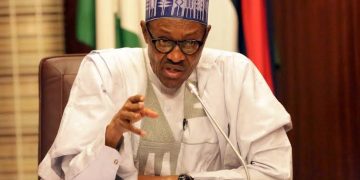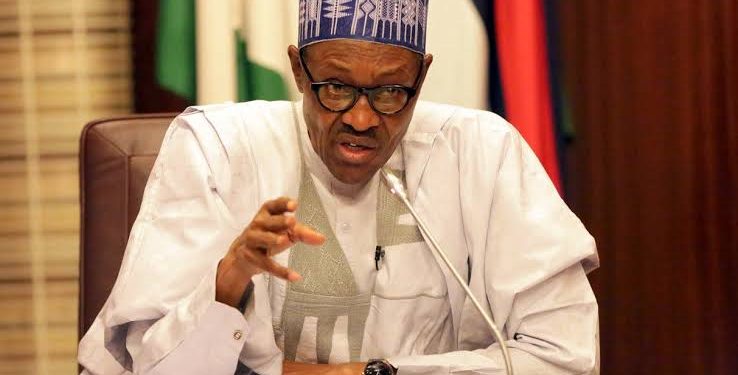By Chioma Iruke
Nigerian President Muhammadu Buhari has charged his Cabinet Ministers to deliver quality performance in executing projects and government policies.
President Buhari who made the disclosure at the Mid-term Ministerial Performance Review Retreat held in Abuja on Monday, also unveiled the Project Management System (PMS) which he said is aimed at tracking and reviewing projects and performances by the government.
According to Buhari, the PMS which is to serve as a tool for measurement of MDAs performance in the implementation of the Ministerial deliverables and the delivery of priority areas against targets, would be set up in the President’s Office, along that of the SGF, as well as in the Office of the Permanent Secretary, Cabinet Affairs Office and the Delivery Unit.
Buahri while declaring the Retreat open, noted that the event was timely, as the nation was striving to remain resilient to its policies and goals despite just coming out of recession and the global pandemic.
The President stated that the progress made in 2020 illustrated the need for intermediate target to address the disconnect between MDAs and key micro-economic activities.
Stating some of the achievements of his regime, the President noted that over the last two years, Ministers have rendered reports to the Federal Executive Council (FEC) on their activities in relation to their Ministerial Mandate.
He added that under his administration, there has been the launch of Nigeria Innovative Fund aimed at addressing innovative opportunities, data networking centre and tech innovations.
On transport he said, “we are growing the quality of roads, railway, air and water transport infrastructure amongst others”.
The president noted that the key focus of the Mid-Term Ministerial Retreat was to review the status of progress towards the delivery of the nine priority areas.
“This is intended to harness our collective contributions towards generating practicable solutions that will guarantee the level of impact we can be proud of by the end of our tenure. The retreat also aims to deepen collaboration and enhance cohesion among Cabinet members for efficient and effective service delivery.
“In order to achieve this objective, therefore, the retreat has been structured to cover 3 main focus areas. The first looks at an overview of ministerial performance within the first two years of the Administration. This will present key achievements and identify opportunities for improvement. The second will reflect on lessons and good practices from other climes, featuring external speakers, including Dr. Akinwumi Adesina, President, African Development Bank; Dr. Ngozi Okonjo-Iweala, Director-General, World Trade Organisation; Ambassador Yonov Fred Agah, PhD, Director General/Chief Trade Negotiator, Nigerian Office for Trade Negotiations; and Dr. Chris Pycroft, Director (Development), Foreign Commonwealth and Development Office. The third part will then focus on new initiatives and strategies to accelerate delivery,” he stated.
President Buhari also announced the approval of N13.3billion for the take-off of the Community Policing Initiative across the country.
He stated that the approval was part of measures to consolidate efforts aimed at enhancing security nationwide.
“We have also approved the sum of N13.3 billion for the take-off of the Community Policing initiative across the Country, as part of measures adopted to consolidate efforts aimed at enhancing security nationwide,’’ he said.
He also announced that the Ministry of Defence had been instructed to create a modest military industrial complex for the local production of weapons to meet some of the requirements of the country’s armed forces.
The President explained that the establishment of the Industrial Complex would address Nigeria’s over-dependence on other countries for military equipment and logistics.
According to him, the project is being implemented under the Defence Industries Corporation of Nigeria (DICON) a military department responsible for arms manufacture.
On other efforts to strengthen national security, the President said it is gratifying to note that Nigeria had received six A-29 Super Tucano.
On the power sector, Mr Buhari noted that the implementation of a ‘Willing Buyer-Willing Seller’ Policy had opened up opportunities for increased delivery of electricity to underserved homes and industries.
He expressed the hope that the execution of critical projects through the Transmission Rehabilitation and Expansion Programme, would result in achieving the national goal of improved power supply by 2025.
On the Petroleum Industry Act signed into law on Aug. 16, the President reiterated his directive to the Implementation Committee to complete all processes for the successful operationalization of the Act within 12 months.
Also speaking, the Secretary of the Federation, Boss Mustapha said from May 29, 2019 to August 31, 2021, the Executive Council of the government had granted 579 Approvals comprising of 381 Contracts, 110 Policies and 88 Briefs/Notes.
“Overall, the total number of Contracts, Policies and Briefs/Notes approved by the Federal Executive Council between November 2015 and August 2021 stand at 1,403 comprising of 878 Contracts, 319 Policies and 206 Briefs/Notes.
“From the above, the 878 Contracts approved by FEC have mostly targeted the provision of infrastructure, geared towards enabling faster economic growth and development. In the same vein, the analysis also shows that the Government remained focused on its cardinal responsibility of responsively addressing the myriads of needs and challenges of its citizens through the 319 approved Policies initiated during the period. The details of this data are contained in the newly developed Compendium of FEC Approvals from November 2015 – August 2021, which is part of the Retreat documents circulated to participants,” he said.


































